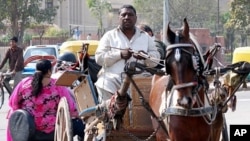As a horse-drawn wagon weaves through a narrow and busy road the driver raises his whip and urges the animal on with shouts of "challo, challo".
Though these animal-driven taxis, known as tongas, have plied the streets of Delhi for centuries, in recent years authorities have relegated them to just a few routes in some of the oldest and most congested parts of the city.
Muhammed Salim, a 20-year veteran tongawallah, explains that he has been squeezed into three routes in front and around the Old and New Delhi railway stations and the central bus terminal.
Salim recalls that when they had those more lucrative routes a tongawallah could earn up to $10 a day.
"Since they've closed many routes we earn about four to five dollars a day and feeding our horses cost us each about three dollars a day," Salim explains.
Salim's father, Yusuf, heads the area's tongawallahs' union, a shrinking trade group of only 232. Most are Muslims who inherited the centuries-old family trade.
Muhammed Bhura, who has operated his tonga on Delhi’s streets for nearly a quarter-century, rejects allegations that the drivers treat their horses, mules and donkeys cruelly - a reason cited for the effort to phase them out.
"We treat our animals well and we love and feed them. There is no other work for us, so what should we do," he asks.
Bhura also says police harass tonga drivers.
"They hit us and chase us away from most places," he says.
Bhura sleeps at the stable to watch over his horse, Kale Baba, and because there is barely room for him in the tiny central Delhi quarters where his wife and children live.
Municipal Councilor Vijendra Gupta, of the Bharatiya Janata Party, initiated the restrictions that he terms a necessary modernization measure.
"Now I'm very hopeful to remove the chaos on the roads and to uplift the position of the tongawallah," says Gupta.
Other officials say ridding the old city of the animals and their feces will reduce the transmission of infectious disease. But Delhi's roads also see traffic from other non-motorized animal transport, such as pack mules and elephants.
Salim is pessimistic about the Municipal Council's plan under which the remaining drivers will surrender their tonga permits.
"They've told us that those who own donkeys or other animals will be given partial financing to buy auto-rickshaws or similar vehicles. Others are being promised some alternative line of work. It would be best if they just let us remain in existence,” Salim says. “We've been here since the Mughal era when we carried royalty."
Councilor Gupta says officials have met repeatedly with tongawallahs to hash out the rehabilitation scheme.
"They agree and they are happy with the new policy," he contends.
The tongawallahs dispute that.
"The drivers are not going to have sufficient funds to pay off their loans for auto-rickshaws. The bank is just going to end up repossessing their vehicles," predicts Salim.
In a roadside stable other tongawallahs complain that many of them will not be able to learn how to operate the more modern form of conveyance or authorities will segregate them in remote areas, where they will earn even less than they do now.




